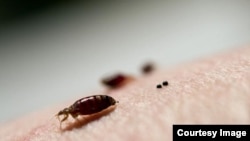They’re ugly and suck blood and now researchers say the lowly bedbugs are becoming resistant to the most common insecticides used to kill them.
Writing in the Journal of Medical Entomology, researchers from Virginia Tech and New Mexico State University say the overuse of commercial chemicals has made many of the pests resistant to the compounds.
"While we all want a powerful tool to fight bed bug infestations, what we are using as a chemical intervention is not working as effectively as it was designed and, in turn, people are spending a lot of money on products that aren't working," said Troy Anderson, an assistant professor of entomology in the Virginia Tech College of Agriculture and Life Sciences.
Specifically, the researchers looked at a group of commonly used pesticides called neonicotinoids, which are often used together with pyrethroids to treat bedbugs.
"Companies need to be vigilant for hints of declining performance of products that contain neonicotinoids," said Alvaro Romero, an assistant professor of entomology at New Mexico State University. "For example, bedbugs persisting on previously treated surfaces might be an indication of resistance."
To determine the bed bugs’ resistance levels, the researchers took samples of the creatures from several locations. Some had been exposed to neonicotinoids and some had been isolated in a lab with no exposure to pesticides. In yet another group, the bugs had been exposed to the poison, but not since 2008.
The bugs from the non-exposed group died when exposed to a small amount of insecticide, while those exposed in 2008 showed “moderate resistance.”
The groups which had been exposed to pesticide “had much higher levels of resistance,” the researchers said.
When exposed to neonicotinoids, bed bugs produce "detoxifying enzymes" to fight the effects of the chemicals. Those bugs with a history of exposure appeared to have more of the enzymes than their susceptible counterparts.
This, researchers say, could mean having to look for other ways to stem the spread of the blood-sucking insects.
"Unfortunately, the insecticides we were hoping would help solve some of our bed bug problems are no longer as effective as they used to be, so we need to re-evaluate some of our strategies for fighting them," said Anderson.
"If resistance is detected, products with different modes of action need to be considered, along with the use of non-chemical methods," said Romero.





